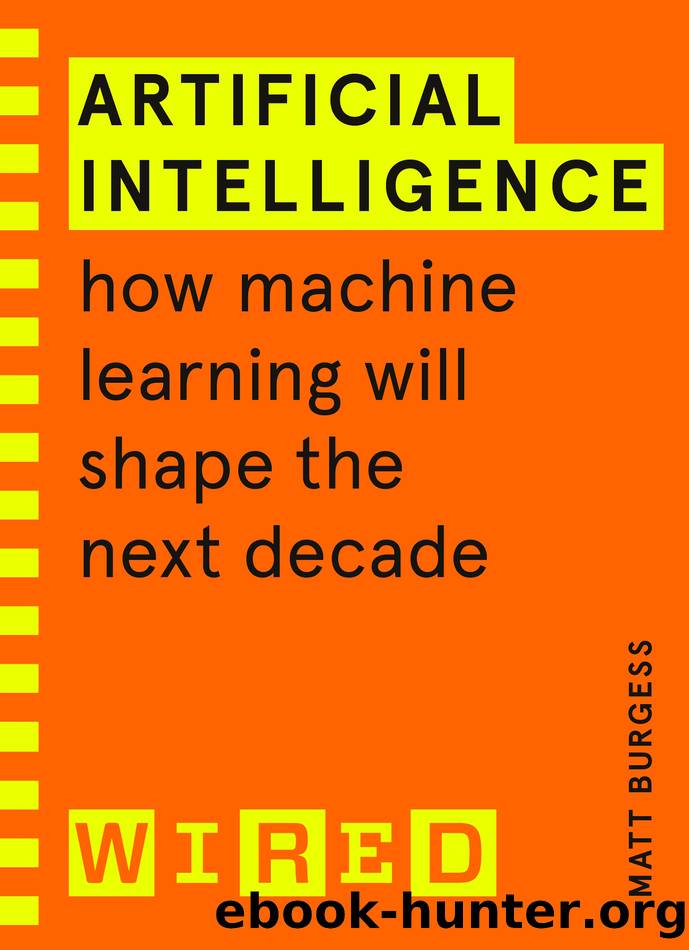Artificial Intelligence by Matthew Burgess

Author:Matthew Burgess [Burgess, Matt]
Language: eng
Format: epub
ISBN: 9781473585614
Publisher: Random House
Deepfakes
Towards the end of 2017, an anonymous Reddit user changed the online world. Posting under the moniker âdeepfakesâ, they started sharing pornographic videos of celebrities, using deep learning to replace the faces of the original performers with those of the famous. Taylor Swift, Gal Gadot, Maisie Williams and Scarlett Johansson were just some of the victims. Since then, deepfakes have become far-reaching.
Photoshopping has, of course, been around for decades. But deepfakes are far more sophisticated and can be just as convincing. Rather than simply relying on a human agent to fit images from different sources together, they feed original footage through an AI program that is able to use the data supplied to generate new data. Generative adversarial networks (GANs), created in 2014, are the commonest tool in use in this sphere. The larger the dataset with which they are supplied, the more realistic the images they generate.
Deepfakes are yet another instance of the challenges to society that AI poses. Their use can be entirely innocent. But they can also cause real harm. And the technology behind them has come a long way since the first poor-quality images created on Reddit. Itâs growing exponentially and is being democratised in the process through freely available online tutorials and open-sourced code. In July 2019 the deepfake detection cybersecurity company Sensity found 14,678 deepfakes online.18 By June 2020 the number had increased to 49,081. Most are pornographic; most target women. Sensityâs June 2020 figures revealed that 1,000 deepfake pornographic videos were being uploaded to mainstream adult video sites every month, gathering millions of views.19 To make matters worse, there are currently no laws in place that can tackle the problem. Victims are left having to navigate existing copyright, defamation and human rights laws in their bids to get non-consensual deepfakes of themselves removed from the internet.
Itâs not just a problem for movie stars and musicians. YouTubers, Instagram stars and women who stream on Twitch have also been targeted by the technology. In October 2020 it was revealed that an AI bot on the messaging platform Telegram was using deepfake technology to âstripâ the clothes from photos of women and generate naked body parts in their place. More than 100,000 women had been victims. Most of those creating the images say they used the technology against women they knew.20
The fact is that the tentacles of online faking are reaching ever further. During the summer of 2019, for example, journalists working for AP found a faked LinkedIn account, with connections to leading influential US figures, was using a profile image developed by a GAN. âWe encounter them very frequently on LinkedIn and Twitter, not even with us looking for them, we just come across these,â explains Henry Ajder, at the time of speaking a threat intelligence researcher at Sensity. âThese images are super-readily available, they are incredibly easy to access.â In December 2019 Facebook removed pages originating in Georgia and Vietnam that Sensity confirmed had used fake images as profile pictures.21 In August 2020 Facebook
Download
This site does not store any files on its server. We only index and link to content provided by other sites. Please contact the content providers to delete copyright contents if any and email us, we'll remove relevant links or contents immediately.
Algorithms of the Intelligent Web by Haralambos Marmanis;Dmitry Babenko(18334)
Jquery UI in Action : Master the concepts Of Jquery UI: A Step By Step Approach by ANMOL GOYAL(10487)
Test-Driven Development with Java by Alan Mellor(7768)
Data Augmentation with Python by Duc Haba(7637)
Principles of Data Fabric by Sonia Mezzetta(7408)
Learn Blender Simulations the Right Way by Stephen Pearson(7322)
Microservices with Spring Boot 3 and Spring Cloud by Magnus Larsson(7162)
Hadoop in Practice by Alex Holmes(6753)
RPA Solution Architect's Handbook by Sachin Sahgal(6539)
The Infinite Retina by Robert Scoble Irena Cronin(6249)
Big Data Analysis with Python by Ivan Marin(5971)
Life 3.0: Being Human in the Age of Artificial Intelligence by Tegmark Max(5558)
Pretrain Vision and Large Language Models in Python by Emily Webber(4927)
Infrastructure as Code for Beginners by Russ McKendrick(4681)
Functional Programming in JavaScript by Mantyla Dan(4561)
WordPress Plugin Development Cookbook by Yannick Lefebvre(4423)
The Age of Surveillance Capitalism by Shoshana Zuboff(4292)
Embracing Microservices Design by Ovais Mehboob Ahmed Khan Nabil Siddiqui and Timothy Oleson(4179)
Applied Machine Learning for Healthcare and Life Sciences Using AWS by Ujjwal Ratan(4162)
